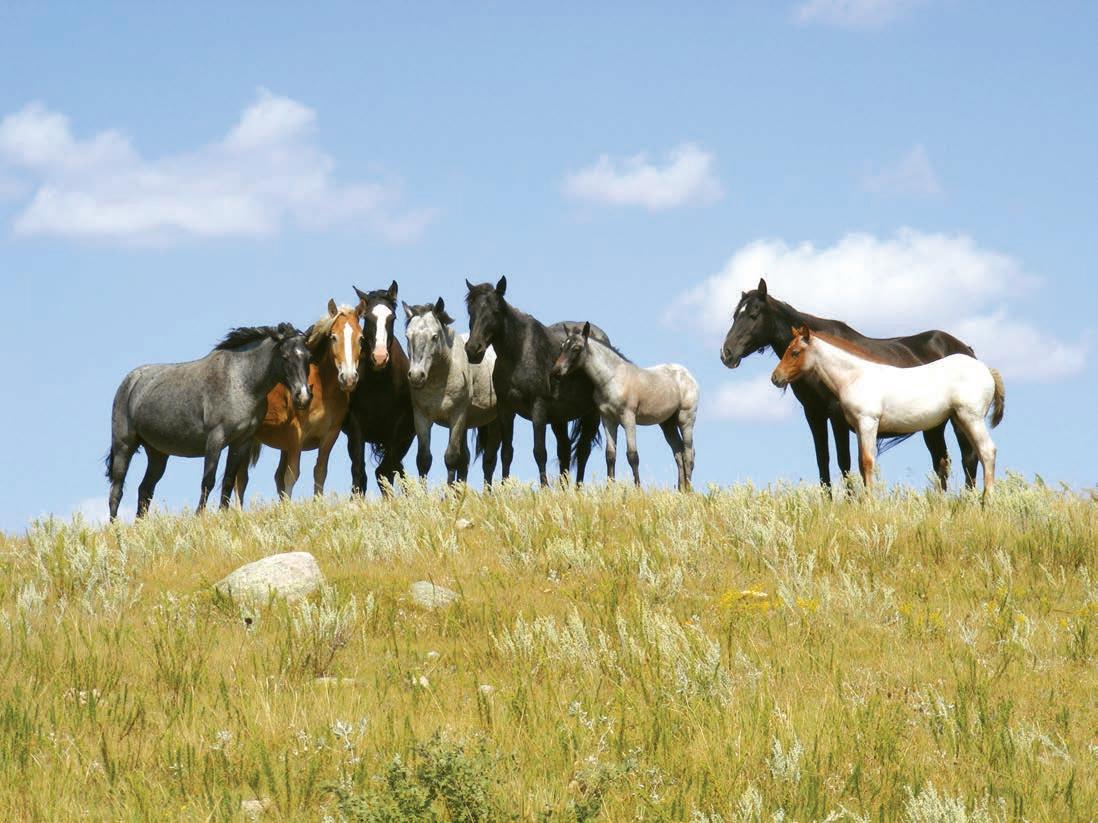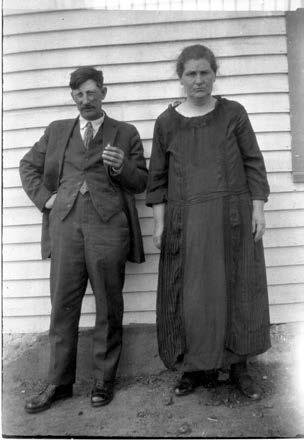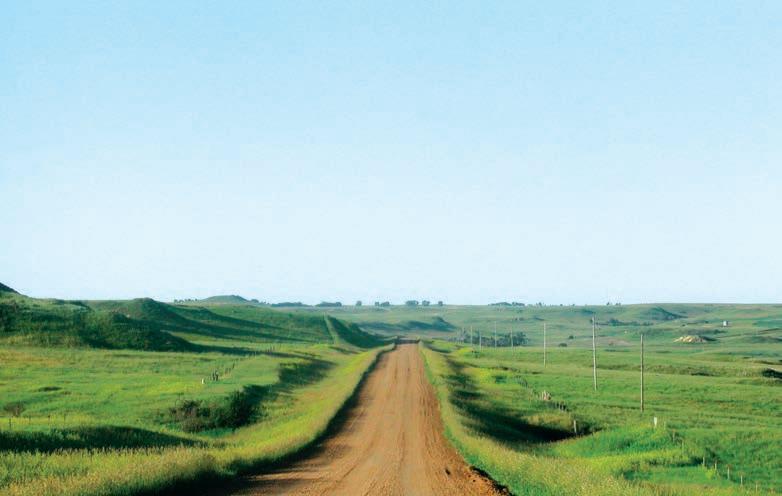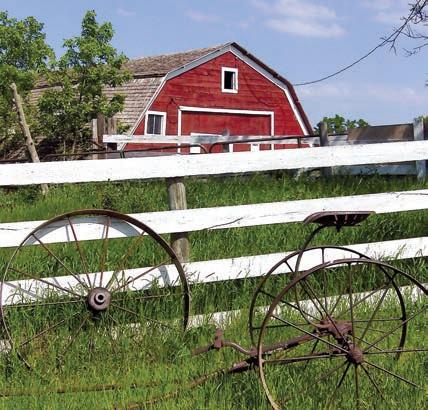
7 minute read
My Version of the Ghost Dance
Cover Image: Delicate Balance by Michelle Lindblom 24X18 monotype
By Cecile Krimm
Advertisement
Here in North Dakota, it’s impossible to feel you truly own the land. Knowing how it came to be in the hands of Norwegians and German settlers in the first place is part of it—a sense that what came out of the hardship of one people can’t help but come home to roost for those who replaced the natives.
Learning many years ago of the Lakota ghost dancers who hoped to bring back the buffalo, I couldn’t help but wince at the futility of such an endeavor and yet, even then, I understood loving a place and a way of life so fiercely you could wish for magic to keep it intact.
That’s why there’s a certain sense of payback to the spoiling of land and society in the Bakken oil field. We can look today with a shake of the head at the decimation of American bison herds in the late 1800s and see the foolhardiness of exploiting that resource nearly to extinction. How much more foolhardy are we now, risking the water and land our homesteading forefathers tamed into one of the most productive breadbaskets in the world, for gas and oil?
Having owned and long ago sold any personal claim to the minerals beneath the surface of the state, I can stand proudly—if poorly—to declare I have nothing to gain from oil. As much as it hurts now to know that I stupidly sold my claim as a twenty-two-year-old “starving” for a new car, I nonetheless am just a little glad I can see this boom—the good and the bad of it—without the added influence of a padded bank account.
I wish the bureaucrats in Bismarck could.
As a whole, we people of North Dakota will have to come to terms with what we’re willing to sacrifice for this embarrassment of riches we currently enjoy. Looking at how we’ve handled things so far, it might appear we’re willing to throw the baby out with the bathwater, charge her rent for the use of the yard, and claim a royalty on the soap.
It’s time for the state to declare northwestern North Dakota nothing less than an economic disaster area—not for lack of jobs or low wages—but due to a societal disease characterized by skyrocketing rents, an inadequate labor pool, and the complete overwhelming of existing public infrastructure.
Would I feel differently if I were sharing in the wealth? Perhaps.But there would be no disputing oil has forever changed our landscape. What is just as alarming, and more immediate, however, are the human costs that are occurring in the state right this minute—never mind the longer range potential for change to our rural society, pristine environment, and agricultural tradition.
This is not about wanting to go back to the way things used to be, but about the government taking steps to ensure basic public safety.
It may sound exciting to the bean counters in Bismarck to talk about another 3,600 workers coming online this winter, but from my vantage point, it’s a little like telling Minot they better prepare for a bigger flood than the one that swallowed 4,000 homes last year.
They talk about flooding the region with an additional population equivalent to the current populations of Burke and Divide Counties combined as if it’s a cause for celebration.
A group called Prairie Opportunity attempted to do just that a few years ago in what seemed to be a ludicrous proposition: to attract “the right 5,000 people” to the area. Their hope has been so far surpassed today that human waste is being poured onto fields as fertilizer because all of the sewage lagoons are full.
We’ve got the right 5,000 people, all right, and more! But along with those good, hardworking folk, we have also attracted people bent on crime, some who are blind to the potential for environmental damage, and many more concerned only with making the quickest buck.
We cannot take anymore.
Our ambulance crews cannot take anymore.
Our police cannot take anymore.
Our water systems cannot take anymore.
Our lagoons cannot take anymore.
Our roads cannot take anymore.
Our stores and restaurants cannot take anymore.
Our rural society, after many long years of decline, doesn’t have the framework to absorb so many people so fast.
Only an irresponsible state government would allow more people to be added in a region where the health and well-being of every single citizen is already in jeopardy because of inadequate infrastructure and overtaxed emergency services. To continue to allow such expansion, unchecked, is to put people’s lives even more at risk.
Too dramatic for you?
Tell it to the eighty-five-year-olds who are being forced from their long-term rental homes in Williston so landlords can rake in ridiculously high rents from newcomers—$2,000, $3,000 or $4,000 per month for a two- or three-bedroom place.
Tell it to the terminal cancer patient living in a camper during a North Dakota winter, or to the family of a woman who died of asphyxiation in a camper because no affordable housing is available in the oil patch.
Tell it to the mother of a teenager involved in an accident with a semi-truck hauling sand or water or oil. Tell it to the mother of three who was run off the road twice in two days by semis traveling too fast to slow down while passing through a small town like Crosby.
Tell it to the guy having a heart attack in a room in a man camp that emergency personnel cannot find in time.
How many people have to die? How many people have to lose their homes? When do the societal impacts of the oil boom move beyond tough-luck stories we share with our friends and neighbors in increasingly more common gripe sessions, and rise to the level of a public crisis?
We are already there and have been for some time.
A publication summarizing the Western North Dakota Energy Impact Symposia, based on anecdotal information collected in the summer of 2011 from people all over the oil patch, confirmed it.
According to the report, 64 percent of those polled last summer said the government is not responding appropriately to the rapid energy development. Nearly a third said they support more regulations and enforcement of some kind.
When do the powers-that-be take a look around and decide quality of life has some value, too?
Quality of life used to be our ace in the hole, that intangible something we told ourselves no one else had and everyone wanted. Well, guess what?
Quality of life got lost somewhere on the way to an oil boom.
There are those who will say they would love to have the problems we have with our two percent unemployment and high-wage jobs. They have no idea. Motorhome cities, camps set up to house a disproportionate amount of single men, and homeless people using Walmart as their home base is not my idea of progress. Nor are stores that appear ransacked, restaurants that are shuttered for lack of workers, or roads that rival the potholes we used to complain of every time we visited Canada.
Everything comes at a cost. We are losing not only our aged—the very people who built our communities— but people of all ages and occupations outside of the oil industry because they can’t afford any more of this “prosperity.” When the oil is gone, those who were displaced are unlikely to return. The place they once called home will no longer exist. A way of life will have disappeared.
All the while, the oil man talks about being a “good neighbor”—the glass beads of yore having been replaced with all manner of truck—from duffel bags emblazoned with company logos to i-Pod speakers and pitchfork fondue suppers. They move this “rendezvous” called the “Oil Can! Cookfest” to a different town each summer, hoping to create good will out of tchotchkes and chili the way fur traders offered mirrors and blankets for pelts.
Lamenting the current state, I feel a little like those ghost dancers. I understand the futility of my word dance in the face of an unstoppable wave of change. Yet, I write, hoping it’s not too late to retrieve some semblance of order, public safety, and economic balance in the oil patch.
Cecile (Wehrman) Krimm has been reporting the news in North Dakota since 1985, winning numerous awards from state and national organizations for investigative, government, and feature reporting on television and in newspapers. She has been the editor of The Journal of Crosby, North Dakota, since 1999 and also edits The Tioga Tribune in Tioga. Her first book, The Brothers Krimm, was published last year, about a serial bank robber who plagued the Dakotas until his death in 2009.








